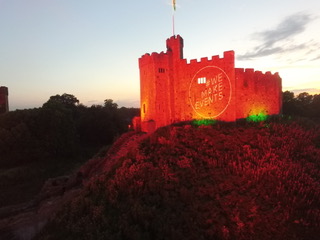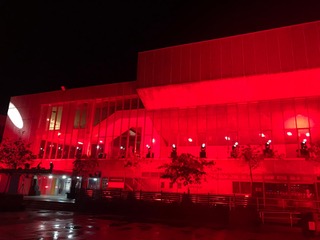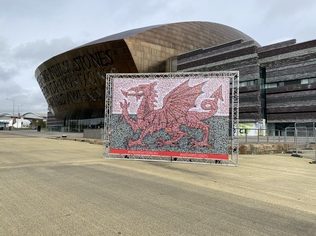Written by Eva Rodericks
In March last year the events industry came to a grinding halt. Arguably, event professionals have been some of the economically hardest hit by the pandemic and also have to deal with the stressful impact of having no confirmed re-start date. As a result, in April 2020 the We Make Events organisation formed, with the Cymru branch forming in June.
I was fortunate enough to speak to a member of We Make Events Cymru, Meg Hastings. Meg studied stage management at the Royal Welsh College of Music and Drama, and has worked in events ever since. Meg has grafted her way into her dream job as a project and operations manager, working on sports events, concerts and festivals.
ÔÇÿLight It In Red’ was one of the first major projects by We Make Events. Event workers across the country lit up major venues in red, to symbolise how the industry is on red alert. The aim was also to highlight the sheer number of people who work in events, including sound engineers, runners, electricians, venue staff, security, video system designers and many more. In Cardiff, City Hall and the Principality Stadium were lit up. Often when the events industry is discussed the first people that come to mind are musicians, but behind every well paid performer is a huge crew, who are not sitting on millions.┬á

Meg has been on furlough for a year, but has still lost around 50% of her income, as she works a full time job and freelances. But she says she is one of the lucky ones – “there are definitely people in worse positions… hundreds of thousands of people have just been excluded from every government backed loan, grant [and] self employment scheme”. The situation appears to be at breaking point, with “people selling their houses, having to move in with family and can’t afford to feed their children – it is awful”. As a result, the organisation is collaborating with Excluded UK to highlight the number of people that have fallen through the cracks of government support.┬á
We Make Events Cymru are asking all event workers in Wales to fill in the survey recently launched on their website, so they can create data that shows the immense number of affected people, to present to the Welsh government.
“The freelance creative industry fund went up around the beginning of September – it was first come first served, so it was so stressful ÔǪ the website was crashingÔǪ and you end up having this feeling you’re in competition with your peers because you need to get that money.” The successful will receive another round of funding, but this leaves the unsuccessful even further behind.┬á

Interestingly, Meg explains to me that holding an event is illegal in Wales, but in England certain events can operate in the lower tiers. Meg says that “what is frustrating is that the UK government and Welsh government receive the same science, and yet the outcomes are so different”. The company Meg works for were due to do three socially distanced pantomimes in England last Christmas, but they were cancelled due to the locations of the theatres moving into tier three.
“The thing that’s frustrating is that Primark can openÔǪ which is managed on the front door but inside there isn’t any queuing, or bubbles to stand in.”
Meg and her colleagues sit in Welsh government task force meetings every two weeks, where they have tried to gain permission to hold outdoor events. These events would be similar to those held in the Virgin Money Unity Arena in Newcastle last summer, which allocated bubbles of up to six people into social distanced areas. The arena saw the likes of Sam Fender, Two Door Cinema Club and Jason Manford perform.
The Welsh government have agreed to hold test events, but this has been put aside due to the high number of cases over Christmas and the winter lockdown, which Meg and her team accept is for the best. Cases will have to significantly drop before test events can go ahead. 

On the 22nd of February the Prime Minister announced the plan to get out of lockdown, which says events can return no earlier than the 21st of June. Wales are yet to release their own plan, but it is anticipated to look similar to England’s roadmap. We Make Events say they welcome the plan, but for events to return their economic requests must be urgently answered. The roadmap gives the industry a rough time frame, but no definite answers.
“We’ve kind of accepted it’s going to be another not normal summer”. Meg says that the UK governments must realise that big events need six months, minimum, planning time. “There is hope for smaller events with less capacity, with low risk demographics, such as families”. There is concern over holding events where people will want to drink alcohol and get “up close and personal at the front of the stage”, as covid is more likely to be transmitted.
I asked Meg how she thinks events will return. She believes it will be phased, with smaller events happening first, gradually building in scale – but this all depends on vaccines, cases and rapid testing.
Nostalgically Meg tells me “going backstage and looking out at the crowd who are having the best time of their life – that is the best feeling.” Hopefully, we can return to times like these in summer 2021.


